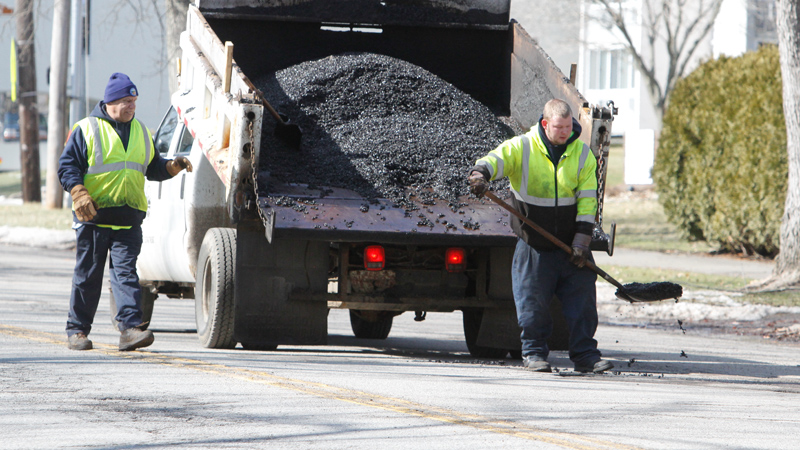Gov. DeWine proposes 18-cent gas-tax increase

Staff/wire report
COLUMBUS
Gov. Mike DeWine’s plan to hike the state gas tax by 18 cents a gallon beginning July 1 to help provide more funding for maintenance of roads and bridges is getting mixed reviews in the Mahoning Valley.
Jack Marchbanks, director of the Ohio Department of Transportation, introduced the governor’s $7.43 billion transportation budget proposal to the House Finance Committee on Thursday.
The gas tax included in the two-year budget would be adjusted annually with the consumer price index to ensure sufficient funding going forward, Marchbanks said. He said revenue raised the first year, by increasing the current 28-cent tax to 46 cents, equates to roughly $1.2 billion and will be split between the department and local governments.
Mahoning County Commissioner David Ditzler said Thursday he’d like the state to configure gas tax distribution to counties based on the total mileage of county-owned roads while state Rep. Michele Lepore-Hagan of Youngstown, D-58th, is worried about the impact on the poor and working class.
Marchbanks told legislators without more revenue in the face of the “impending transportation crisis,” there will be no funds for any highway improvement projects in the state and roads will deteriorate.
Statistics show deteriorating road conditions lead to more crashes, which lead to more fatalities, he said.
If the Legislature approves the recommendations, the proposal would provide the department in fiscal year 2020, which begins July 1, with $750 million additional dollars in revenue to pave roads, fix guardrails, fill potholes, clear snow and ice, maintain bridges, and improve safety, Marchbanks told the committee.
He said it also will provide local governments with a significant increase in the funding, including $1.6 million for every county in the state.
Ditzler said to distribute the funds in 88 even allocations is “totally unfair.” The Mahoning County engineer’s office has estimated it would cost about $70 million just to bring all county-owned roads in poor condition back up to acceptable grade, he said.
“It’s obviously a step in the right direction – they’re trying to address some of the problems – but I think the money they’ve taken from us locally should be looked at rather than adding additional taxes onto taxpayers,” he said, referencing cuts to the state’s Local Government Fund and the recent loss of a sales tax on Medicaid-managed care organizations, which on its own accounts for a $4.7 million annual loss.
Marchbanks has previously said that contracts for road maintenance that totaled $2.4 billion in 2014 may drop to $1.5 billion in 2020, and a $1 billion gap remains in the department budget.
Lepore-Hagan said she expects her district will feel the hike more than others in the state.
“Working families, the elderly – most of the people in my district, really, who have been doing everything right and are now asked to do a little bit more,” she said. “But it is a real bottom line. We deserve safe roads, but working people in Ohio can’t afford to do more than their fair share.”
Lepore-Hagan said although she expects bipartisan discussion on DeWine’s proposal at the Statehouse, she has concerns. She said she feels the administration should rather re-consider favorable tax breaks to the wealthy class.
She also suggested offering gas-tax rebates for those at 150 percent of the poverty line or below, increasing public transit funding or any other measures that “make it more fair across the board.”
Local township administrators said boosting road budgets means more paving projects.
“We could do another 2 Ω miles of resurfacing [in a year],” said Michael Dockry, administrator for Austintown Township, which can expect its gas tax take to more than double in 2020 – $286,768 more, up to $525,433 – if the increase is approved.
“It would go a long way in helping us catch up to all the roads that need [to be] resurfaced.”
The township is responsible for about 115 miles of road. Last year, the township spent about $350,000 on township roads, including a $150,000 Ohio Public Works Commission grant, and is on track to spend $550,000 this year, including that same grant amount.
“Obviously anything that can be done to help relieve the cost of paving is huge,” said Jason Loree, Boardman Township administrator.
Currently, Boardman receives $270,320, but the increase is supposed to result in the township receiving $605,218 in 2020. Loree suggested next looking at how gas tax is distributed.
“Maybe look at it in terms of road and mileage might also solve some problems,” he said.
Youngstown would see its share of the gas tax increase from $1,883,671 to $3,253,473 annually under the proposal.
“The increase will help Youngstown work with the Ohio Department of Transportation to tackle the crumbling infrastructure of our streets and major state roadways that are in the city,” Mayor Jamael Tito Brown said.
He added, “We currently pave about 31 lane miles per year with our paving program. With the gas-tax increase, we would have the funds to pave roughly 50 lane miles per year.”
The city, Brown said, paves about 60 streets under its neighborhood paving program annually. If the state approves the additional tax, that would increase paving about 85 to 90 streets annually, he said.
 43
43
